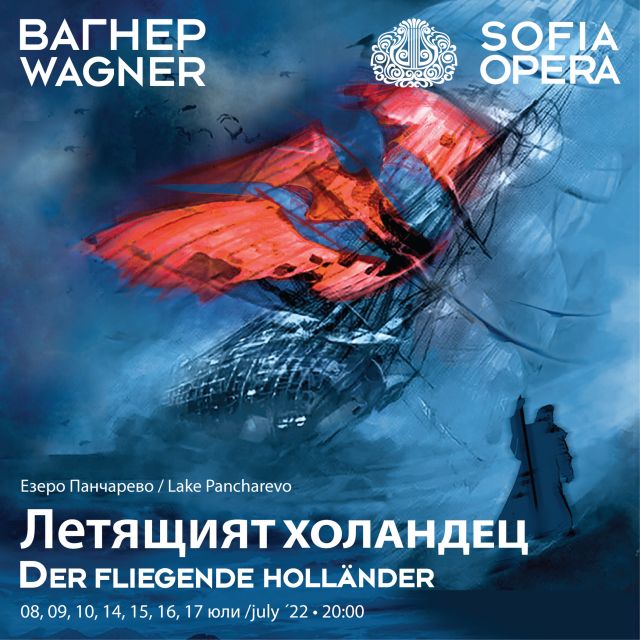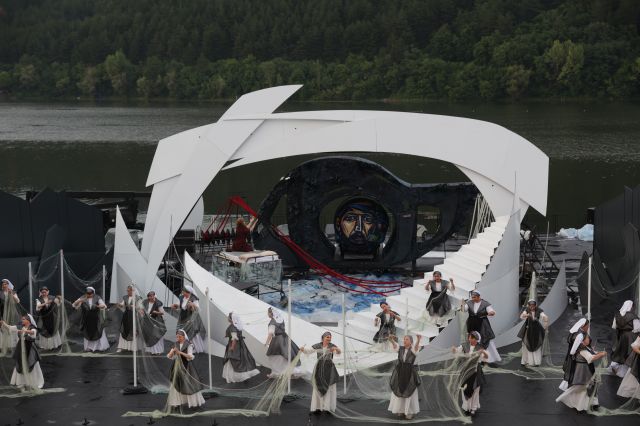I wish an unforgettable evening with one musical masterpiece recreated in a wonderful production, with superb participants in a magical place, added the maestro.
The conductor Rossen Gergov will conduct the opera "Der fliegende Holländer" by Richard Wagner, which will premiere on 8 July as part of the "Muses of Water" festival at Lake Pancharevo.

Who is Rossen Gergov?
Gergov is gaining widespread recognition for his appearances both on the concert platform and on the opera stage, with repertoire from Mozart to works, considered as the greatest challenges of contemporary music. Gergov held the position of Chief Conductor of the Bulgarian National Radio Symphony Orchestra until 2017. He also works regularly with the Sofia Philharmonic Orchestra as one of the principal guest conductors.
His recent appearances at Opera North, England (Mieczyslaw Weinberg's "The Portrait") and at the Bregenzer Festspiele, Austria (opening concert with the Vienna Symphony Orchestra) confirm his place as one of the brightest talents among the conductors of the younger generation.
Until 2017, Gergov was chief conductor of the Bulgarian National Radio Symphony Orchestra. He regularly works with the Sofia Philharmonic as one of the main guest conductors.
He has performed with the Polish National Radio Orchestra.
Having gained impressive experience in the field of opera, Gergov directed spectacles at the Bregenz Festival, Austria, where he conducted on stage in the lake "Tosca", "Playing Away" by Benedict Mason and the Austrian premiere of Weinberg's "The Portrait"; "Die Fledermaus" and "Rigoletto" at the Wiener Volksoper; "La Traviata" and "Le nozze di Figaro" at the Meininger Theater; "Carmen" in Varna; the world premiere of "Prinz, Held und Füchsin" by Akos Banlaky in Vienna and the Czech premiere of "Cassandre" by Michael Jarrell at the Brno National Theatre.
Among the orchestras Gergov has worked with are the Bamberg Symphony Orchestra, the BBC Symphony Orchestra, the BBC Scottish Symphony Orchestra, the Tokyo Metropolitan Orchestra, the Vienna Symphony Orchestra, the Orchestre National de Montpellier Languedoc-Roussillon, the Orquesta Sinfonica del Principado de Asturias, and the Ensemble Orchestral de Paris, the Kyoto Philharmonic Chamber Orchestra, the Osaka Century Orchestra, the Polish National Radio Orchestra, the orchestras of Basel, Kyoto, Sapporo, Tokyo, Hiroshima, Jena, Graz, Nagoya, the Norrlandsoperan and the Zagreb Philharmonic. In the current 2022/23 season, the conductor will debut with orchestras such as I Pomeriggi Musicale, Sinfonia Finlandia, Juvaskyla and the BNR Symphony Orchestra.
Rossen Gergov is a laureate of the First International Competition for Conductors is a laureate of the First International Competition for Conductors named after Evgeny Svetlanov, organized by the Luxembourg Philharmonic Orchestra, held in May 2007. His recording of works by David Chesky with the Norrlandsoperan Symphony Orchestra was nominated for the Grammy Awards in 2008. Gergov has recorded for the BBC, the Bavarian Radio and ORF Austria.
- Mr. Gergov, "Der fliegende Holländer" is Richard Wagner's most popular and most frequently performed opera. What is your feeling about this work?
- Undoubtedly, "Der fliegende Holländer" is a masterpiece of operatic art and also an exceptionally important opera for Wagner himself, in which he sets the beginning of his own musical journey. For me personally, this is a highly dramatic and affecting opera, with prominent characters and strong dramaturgy.
- You will conduct "Der fliegende Holländer" at the "Muses of Water" festival at Lake Pancharevo. Will this particular Wagner work be perceived differently under the open sky?
- "Der fliegende Holländer" fits perfectly on such a stage as the Pancharevo one. In this opera, natural elements such as wind, waves, separately supernatural elements such as the ghostly crew of the "Dutchman" play an important role. Such a setting as the lake stage offers helps to stimulate the audience's imagination to experience the whole drama more deeply.
- How did you accept this invitation from Acad. Kartaloff?
- It was a great pleasure and joy for me to receive the invitation to conduct such a responsible premiere with a wonderful title. I thank Academician Kartaloff from the bottom of my heart for the trust!
- You have an impressive background in the field of opera. Which work has left a lasting impression in your career?
- There are several works that have played an important role in my career so far. Among them are traditional titles such as "Tosca", "Carmen", "Salome", but also not-so-known titles such as "The Portrait" by M. Weinberg, "Powder her Face" by T. Adès and "Playing Away" by B. Mason.
- You have won wide international acclaim, both for your performances on the concert podium and the opera stage, with a repertoire from Mozart to works defined as the greatest challenges of contemporary music. What has actually been the biggest challenge for you in your music career?
- Among the big challenges, I can point out the opera "Playing Away" by B. Mason, which I staged at the festival in Bregenz 2007 and in St. Pölten 2008. It was an incredibly complex production with a very long rehearsal period, an extremely difficult score, especially for the chorus and the orchestra, and overall, it was a very difficult production for all participants; And "Secret Theatre" by H. Birdwistle is one of the most complex scores I've personally come across.
- Isn't Wagner a challenge? Are there any particularities when conducting works by Wagner?
- Conducting Wagner is always a challenge, mainly because of the length and volume of his later operas. "The Dutchman" is a short work and this does not play a special role in this case, the difficulties are related to the balance between the soloists and the orchestra, as well as stage-orchestra coordination in the mass scenes (the beginning of the Act 3, the famous chorus scene).
- This work is said to be one of the top achievements of German romantic opera. Is there romance in Wagner's operas? Where does this Wagnerian romanticism lie?
- Wagner saw himself as the successor to earlier German Romantic composers such as Weber, for example. Especially in "The Dutchman", the romance is in the personal drama of each of the characters, mainly in Senta with her self-imposed destiny to be the woman who will deliver the Dutchman from his lot, as well as the Dutchman himself, who is torn between faith and desire for deliverance on the one hand and despondency and collapse on the other. As I have already said – each character has his own complex drama – like the composers, poets, artists of that time themselves.

- Mr. Gergov, what would you wish to the opera lovers, to the spectators who will come to enjoy this masterpiece?
- I wish an unforgettable evening with a musical masterpiece recreated in a wonderful production, with superb participants (soloists, chorus, orchestra) in a magical place.
Interview by Olya Al-Ahmed

 Olya-Al-Ahmed Author in Fakti.bg
Olya-Al-Ahmed Author in Fakti.bg